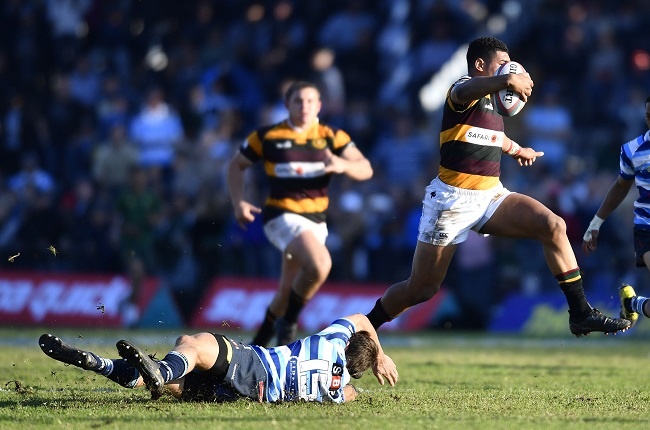
- SA Rugby and the SA Schools Rugby Association face an anxious wait until 8 February to determine whether the sport can resume at grassroots level for 2021.
- Rassie Erasmus, national director of rugby, noted how the Covid-19 pandemic is having an adverse effect on youngsters on all fronts, especially since they potentially don't have a platform to get contracted from.
- One contingency plan is to use SA Rugby's EPD database to organise bio-secure training camps and trials for some of the prominent players identified by the governing body.
An anxious three-week wait stares SA Rugby and schools - represented by the South African Schools Rugby Association (Sasra) - in the face to determine whether the game can resume at grassroots level in 2021.
As reported last week, the member's forum decided, in conjunction with the national governing body, to delay the decision until 8 February due the continued uncertainty created by South Africa's second wave of Covid-19 infections.
Rassie Erasmus, the national director of rugby, was in attendance.
"I know it's not a long time, but we decided on the 8 February date to see how things pan out and whether infections plateau and go down. We'll then continuously monitor whether or when can schools rugby start and if the Craven Week can take place," he said.
Yet there are legitimate fears that the pandemic could leave the unprecedented and hugely problematic legacy of a group of youngsters who'd never have played first-team rugby and possibly also experiencing a limited amount of age-group rugby.
"I was in the meeting with Sasra last week and they're desperate to play," said Erasmus.
"There are a lot of things from the pandemic that's affecting the boys really negatively at school itself and with regards to their rugby careers.
"What's really concerning is that there's simply no platform to contract them from if there's no rugby to play."
The ideal then is for schools rugby to re-start in some form this year, though Noel Ingle, Sasra's chairperson, noted in correspondence last week that constituents are adamant that the resumption needs to reflect "planning that's been approached in a structured way" that "provides hope to coaches and players".
Another major headache is how Covid-19 testing protocols will be amended and implemented, particularly given its costs.
According to Sasra, return to training would commence in three phases:
Phase 1: A minimum of four weeks' non-contact training. Emphasis will be on strength and fitness.
Phase 2: If permitted by government regulations, a minimum of four weeks' gradual integration of contact training.
Phase 3: Return to play
However, if infections don't show a significant decrease, SA Rugby will have to take the lead in trying to ensure that the stalled pipeline somehow gets going.
Erasmus' trump card in that regard is the federation's Elite Player Development (EPD) programme.
"If schools rugby and tournaments can't be resumed, we will submit the EPD plan to try and get the players of note identified to other parties. That database is pretty awesome, we've been doing it for six years. We might miss a few because we couldn't get to everybody, but in general it's quite comprehensive," he said.
"Our EPD commences is from Under-15 level, where we rank players. We identify a group of 45-60 potentially promising players and in each position we select the best three candidates."
Interesting to note is that the EPD has a very strong transformation imperative.
"We've implemented the principle that if we don't have a player of colour in that top three, we pick four or five until we have two players of colour in each position," said Erasmus.
"If it’s three white boys and there's simply no other suitable players, we still pick no four and five, keep them in the system and make extra interventions to develop them. They still stay part of the elite system.
"So, we actually walk a path with players from the time they turn 15. One problem is that from all the work we've done from 2014's intake (relevant to the current batch of Under-18s and Under-19s), we've lost much of it because of the Craven Week and SA Schools games being cancelled."
However, regardless of whether the logistical consequences of Covid-19 have diluted the comprehensiveness of the EPD, it's likely still the only tool to get some promising schools players engaged in some form of action.
"The plan is maybe to get those guys that EPD identified into camps and let them play trials against each other to have some kind of platform.
"That's one of the contingency plans. We'll present it on February 8 if there are no change to the infection rates," said Erasmus.
Such an intervention would be similar to the one-round Provincial Under-21 Championship held late last year.
"That's why the Under-21 competition was played in a bubble, just for the franchises to make an assessment, to have them at one venue at least to get some indication. They would've signed guys and released some without seeing some of them otherwise," said Erasmus.
